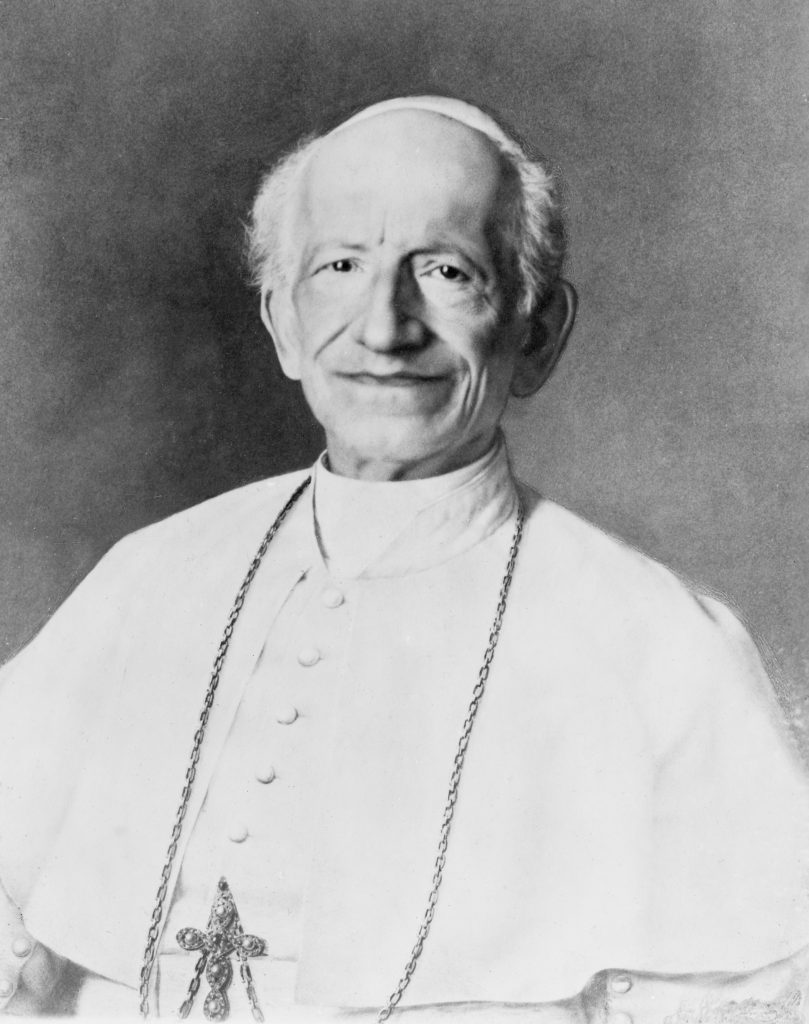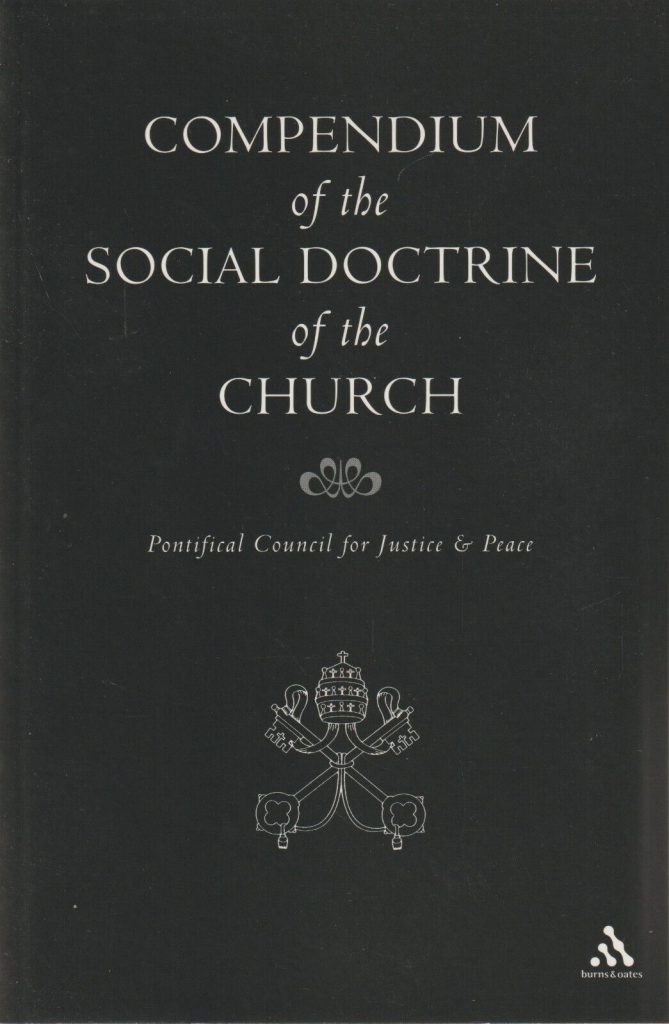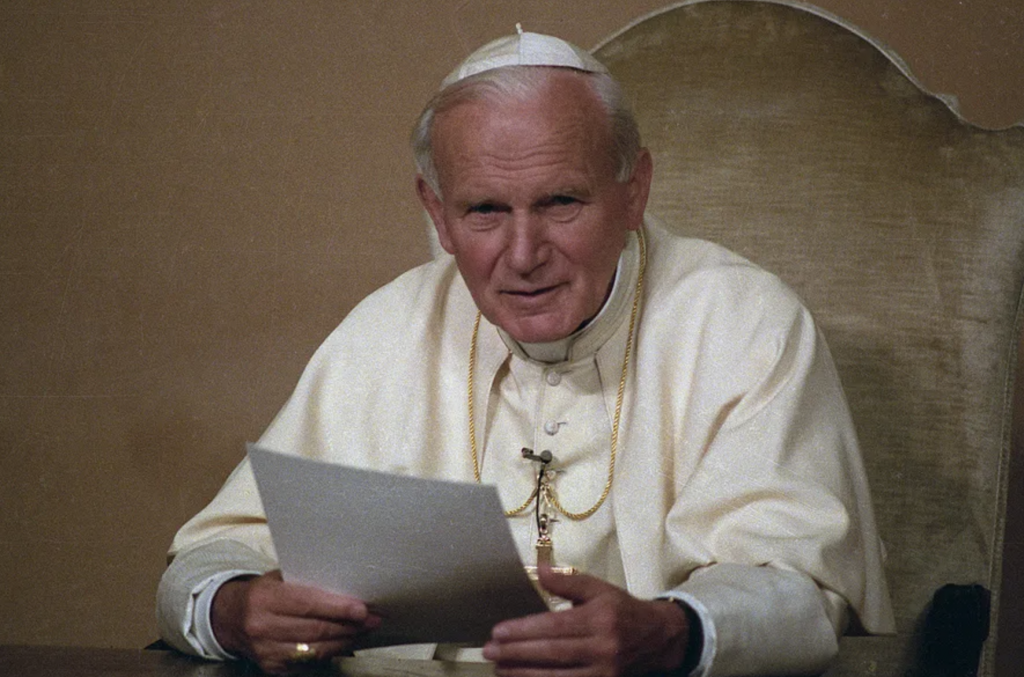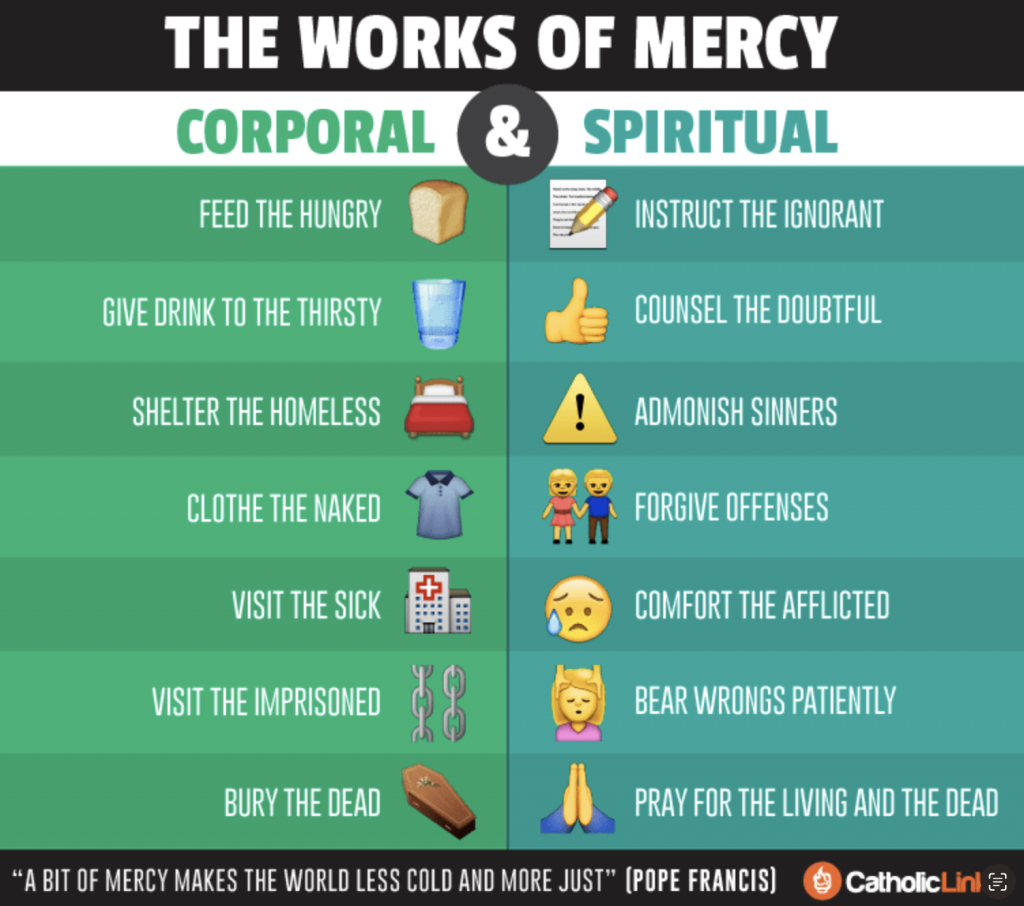
Modern Catholic Social Teaching commences in 1891 with Pope Leo XIII’s encyclical, Rerum Novarum, a response to the Industrial Revolution. Catholic Social Teaching is drawn from the Gospels; from reflection on the Gospels over two millennia; and from human reason, in particular, natural law, considered in the light of contemporary social conditions.
Natural law thought has always had a personalistic aspect, sometimes more in evidence, sometimes less. Catholic Social Teaching is personalistic. That personalism is particularly evident in the Gospels, from which Catholic Social Teaching draws its inspiration. It is also evident amongst some Jewish and Christian scholars in the twentieth century, scholars who have had an influence on Catholic thought.
Like a vast rambling medieval cathedral, ever reaching higher, modern Catholic Social Teaching started from humble and partial beginnings, constructed by largely anonymous artisans, content to do something beautiful for God, even in places almost unobserved, except by God.
Catholic Social Teaching now deals with all sorts of topics, with subtlety and finesse, now emphasising this, now that, providing inspiration to peoples in widely different places and cultures, but always from the perspective of the Gospels, always from the perspective of human reason, always from the perspective of the human person.

Gospels
One finds in the Gospels a re-affirmation of the Ten Commandments, the Decalogue, first found in Jewish scriptures, which define, in specific ways, good living, involving respect for God; respect for human life; respect for one’s spouse, for one’s children, for one’s parents; respect for the property of others; respectful and truthful communication; motivations and attitudes which are respectful of others. Jesus of Nazareth, reaching back to the Jewish scriptures, sums up the Decalogue in the twofold law of love, of God and of neighbour; in the Golden Rule, to treat others as one would wish to be treated; in respect and love for each and every person, made in the image and likeness of God.
The Beatitudes are the perfection of the Ten Commandments, a summary of the life of Christ to which we are called, a series of interior ways of being, whose exemplar is Jesus of Nazareth. We are called to forget ourselves, to be humble, to be patient in adversity, to be sorry for sin, to hunger and thirst for justice, to be merciful, to be well-intentioned, to be peacemakers, to suffer persecution and trials with forbearance. Jesus of Nazareth urges us to forgive others without measure. The parables of Jesus of Nazareth see creation as good, and human interaction with creation as respectful of the goodness of that creation. We are stewards of creation. The miracles of Jesus of Nazareth address the troubles of the person, the good of the person, whoever he or she may be.
Other Ways
Christianity cannot consistently endorse the red-neck politics of hostility to others (indigenous peoples, boat people, unlawful immigrants, the unemployed, social security recipients, the physically and mentally disabled, prisoners, unpopular social groups). Christianity cannot consistently endorse hostility to the environment, and reasonable environmental causes. Christianity cannot consistently endorse contempt for “losers”, ethnic and religious hatred, hatred directed to anyone.
Nor does Catholic social thought endorse the ways of factionalism; the end justifying the means; character assassination; calumny; detraction; rejoicing in the faults of others; the stab in the back; pretending to be one thing, being in fact another; bribery; graft; concern only with special interests; lying –which seem to be the way of so much modern politics.
Nor does Catholic Social Teaching endorse the excesses of contemporary capitalism: consumer rip-offs; fraud, often under the pretence of sticking to the letter of the law, or under the pretence of fidelity to contractual agreement; dangerous products; deceitful advertising and marketing; failure to pay workers a family wage; unreasonable anti-family hours and conditions; unsafe working conditions; mistreatment of injured workers; wrongful declinature of legitimate insurance claims; sacking employees in the pursuit of a slightly better bottom line; abuse of market power, often directed to destroy small business; defective and unsafe products; substandard construction of residential buildings; abuse of tenants; environmental pillage; engagement in “business” directly destructive of human persons (modern slavery, often involving forced prostitution, biotechnology which reduces persons to objects, the arms trade, sexual tourism, pornography); engagement of mercenaries in war; expropriation of family farms without compensation to make way for other projects; theft of intellectual property; cyberwarfare; disclaimer of responsibility by social media giants for content destructive of persons; excessive prices and interest rates; “lending” to persons who cannot afford to borrow, and who are incapable of assessing a credit proposal; people smuggling; bribery of public officials.

Leadership
The Gospels present leadership as requiring self-giving, not self-assertion. The Gospels present the two great counter-examples of King Herod, and the Roman governor, Pontius Pilate, as well as the petty squabbling and ambition of the twelve. Despite the counter-examples of King Herod and Pontius Pilate, law is to be obeyed, human authority being willed by God. But God’s law is to be obeyed when human law conflicts with the law of God. We are to obey God rather than man.
We are to pay our taxes, and comply with other obligations to the community within which we live. There is a distinction apparent from the first between church and state, between God and Caesar. Christianity can flourish in many different societies, respecting quite different customs and cultures, drawing the best from difference.
Christianity does not have a narrow political agenda, endorsing specific options. Christians are not a bunch of political revolutionaries. No doubt Christianity will radically alter a society, but over time, as consciences of particular persons become attuned to the full demands of the Gospel, as persons are converted and lead a new life. Christians do not renew society through bloodshed, but imperceptibly and gradually, by encouraging persons to repent, and to live lives of virtue.
“Christian” Politicians
We should consider cautiously the claims of politicians who claim to be “Christian”, seeking support for a particular political programme, especially if it is punctuated by sharp dealing, Machiavellianism, factionalism, personal enmity, even hatred, calumny, detraction, concern for special interests, abuse of the law. We should consider cautiously those who focus on a single issue however good, but who are indifferent to broader issues of peace and justice and freedom.
Universalism
There is a universalism in the approach of Jesus of Nazareth exemplified in the parable of the Good Samaritan, and in the mandate to preach the Gospel to all. The urging of the Jewish scriptures that we are to have regard to the widow, the orphan, the stranger is broadened in the teaching of Jesus of Nazareth. We are to love one another as God loves us, as Jesus of Nazareth loves us, and to see Jesus of Nazareth in the other.
Encyclicals
So, modern Catholic Social Teaching is an elaboration of the Gospels in the circumstances of the 21st century. The social encyclicals which succeed Pope Leo XIII’s Rerum Novarum address particular issues from a theological-moral perspective in the light of the Gospels, in the light of the tradition of the Church down the ages, in the light of natural law thought:

| Date | Author | Source |
|---|---|---|
| 1891 | Leo XIII | Encyclical Rerum Novarum: on the Condition of the Working Classes |
| Leo XIII affirmed: -right to own private property -rights of the family -obligation to uphold the common good -obligation of the state to intervene to protect workers -the poor and badly off have a claim to a special consideration by the state -the law should address the causes of strikes -working conditions should protect workers –wages ought be just and sufficient to support a worker and his family –widespread property ownership ought be encouraged -workers have the right to form unions Leo XIII condemned class war. Leo XIII’s Rerum Novarum had significant consequences for workers in many countries. Rerum Novarum is the Magna Carta of Catholic Social Teaching. | ||
| 1931 | Pius XI | Encyclical Quadragesimo Anno: on Reconstructing the Social Order |
| Pius XI’s Quadragesimo Anno follows closely in the path of Rerum Novarum: -vindicating the right to private property, but also the obligations of owners, -urging the just distribution of wealth, -urging a just wage capable of supporting the worker and his or her family, -enunciating the principle of subsidiarity: Just as it is wrong to withdraw from the individual, and commit to a group, what private enterprise and industry can accomplish, so to it is an injustice, a grave evil and a disturbance of right order, for a larger and higher association to arrogate to itself functions which can be performed efficiently by smaller and lower societies. -upholding the right of association in trade unions | ||
| 1937 | Pius XI | Encyclical Mit Brennender Sorge |
| Mit Brennender Sorge, written in German, and smuggled into Germany, was read on Palm Sunday 1937. This Encyclical is, on any view, a condemnation of Nazism, and all it stands for, expressed in the strongest terms. | ||
| 1937 | Pius XI | Encyclical Divini Redemptoris: On Atheistic Communism. |
| Like Mit Brennender Sorge, dated a week earlier, Divini Redemptoris is a condemnation of totalitarianism, specifically communism. These two encyclicals establish the Church as the far-sighted defender of the human person against totalitarianism at a time when some from European and American elites, particularly intellectuals, were engaged in a love affair with totalitarianism which, on the part of some, continued to Khrushchev’s 1956 denunciation of Stalin, and to the collapse of the Soviet Union in 1991. Although not included usually in many lists of social encyclicals, these two encyclicals demonstrate the Church at its finest. | ||
| 1939 | Pius XII | Encyclical Summi Pontificatus: on the Unity of Human Society |
| Summi Pontificatus was released following the outbreak of World War II: -urges a return to natural law -urges respect for international law including treaty obligations -rejects the totalitarian state, and the state which regards itself as beyond natural law, ‘state worship ’Summi Pontificatus refers to the blood of so many who have been cruelly slaughtered, non-combatants, crying to heaven, from Poland. The Church’s response to World War II was both insightful and courageous. | ||
| 1961 | John XXIII | Encyclical Mater et Magistra: on Recent Developments of the Social Question in the Light of Christian Teaching |
| Mater et Magistra: -upholds the right of workers (and their representatives) to participate in decision making -upholds the desirability of a wide distribution of ownership of property -considers economically less developed countries, and the obligation to less developed countries -considers how differences of opinion can be addressed: In the application of Christian Social Doctrine, there can arise, even amongst upright and sincere Catholics, differences of opinion.When this happens, they should be careful to preserve mutual esteem and respect, and should strive to find points of agreement for effective and suitable action.They should not exhaust themselves in indeterminable contentions and, under the pretext of seeking to prove their view to be best, omit to do the good they could and should do. | ||
| 1963 | John XXIII | Encyclical Pacem in Terris: World Peace |
| John XXIII embraced the language of human rights which derive from natural law and involve corresponding obligations and an attitude of responsibility. This is an encyclical every Catholic lawyer should be familiar with. | ||
| 1965 | Second Vatican Council | Pastoral Constitution on the Church in the Modern World: Gaudium et Spes |
| Gaudium et Spes is an outline of philosophical and theological anthropology with regard to marriage and the family, culture, economic and social life, the political community, fostering peace and the community of nations. | ||
| 1967 | Second Vatican Council | Declaration on Religion Freedom: Dignitatis Humanae |
| This document declares that the right of religious freedom has its foundation in the dignity of the human person, in the nature of the human person. | ||
| 1967 | Paul VI | Encyclical Populorum Progressio: on the Development of Peoples |
| This encyclical is remarkable for its condemnation of a certain form of capitalism: But it is remarkable that on these conditions of society, a system has been constructed which considers profit as the key motive for economic progress, competition as a supreme law of economics, and private ownership of the means of production as an absolute right that has no limits and carries no corresponding social obligation…one cannot condemn such abuse too strongly by solemnly recalling once again that the economy is at the service of man. | ||
| 1971 | Paul VI | Apostolic Letter Octogesima Adveniens |
| This encyclical is remarkable for its discussion of ideologies including socialism, Marxism, liberalism, utopianism. As to liberalism, Paul VI comments: …at the very root of philosophical liberalism, is an erroneous affirmation of the autonomy of the individual in his activity, his motivation, and the exercise of his liberty. Hence, the liberal ideology…calls for careful discernment… | ||
| 1981 | John Paul II | Encyclical Laborem Exercens: on Human Work |
| Laborem Exercens reasserts a personalist approach to work, emphasizing the priority of labour over capital, condemning both what it calls “economism” and “materialism”. | ||
| 1981 | John Paul II | Apostolic Exhortation: Familiaris Consortio Regarding the Role of the Christian Family in the Modern World |
| 1987 | John Paul II | Encyclical Sollicitudo Rei Socialis: on Social Concerns |
| Sollicitudo Rei Socialis is a critique of a purely economic model of development, privileging “having” over “being.” | ||
| 1988 | Congregation for Catholic Education | Guidelines for the Study and Teaching of the Church’s Social Doctrine in the Formation of Priests |
| 1991 | John Paul II | Encyclical Centesimus Annus |
| Written in the context of the Velvet Revolution, the largely peaceful collapse of communism in Eastern Europe, in which John Paul II played no small part, Centesiumus Annus, 100 years after Rerum Novarum, contains a discussion of democracy from the perspective of the human person. | ||
| 1992 | Catechism of the Catholic Church | |
| The Catechism is declared in carefully chosen words by Pope John Paul II to be “a sure norm for teaching the faith …” Elsewhere, the Catechism is said to be “an organic synthesis of the essential and fundamental contents of Catholic doctrine as regards both faith and morals.” The Catechismwas prepared under the leadership of then Cardinal Joseph Ratzinger. One must go back to the “Roman Catechism” published in 1566 (three years after the closure of the Council of Trent) for a comparable statement of Catholic belief and practice. Relevant to Catholic Social Teaching is the dignity of the human person (1700-1709); freedom (1730-1740); the morality of human acts (1749-1761); conscience (1776 – 1800); person and society (1877 – 1896); participation in social life (1897 – 1927); social justice (1928-1948); respect for the dignity of persons (2284-2301); safeguarding peace (2302-2317); the social doctrine of the church (2419-2462). If one wants a quick summary of Catholic Social Teaching, the Catechismis the first place to go. | ||
| 1993 | John Paul II | Encyclical Veritatis Splendor: on Certain Fundamental Questions of the Church’s Moral Teaching |
| Veritatis Splendor is the first encyclical ever setting out the fundamentals of the Church’s moral teaching. While not usually included in a listing of social encyclicals, Veritatis Splendor is important for understanding the context of Catholic Social Teaching. | ||
| 1995 | John Paul II | Encyclical Evangelium Vitae: On the Value and Inviolability of Human Life |
| Evangelium Vitae is not often included amongst the documents of the Church’s social teaching. It contains a masterful consideration of the relation between human law and natural law (68-77). | ||
| 2002 | Congregation for the Doctrine of the Faith | Doctrinal Note on Some Questions Regarding the Participation of Catholics in Political Life. |
| The Doctrinal Note is, in some ways, a response to politicians who trade on their Catholicism, and yet adopt programs, and support legislation, contrary to exceptionless moral norms. | ||
| 2005 | Compendium of the Catechism of the Catholic Church. | |
| The Compendium is described by Pope Benedict XVI as containing, in concise form, all the essential and fundamental elements of the Church’s faith. What seems to me significant about the Compendium is that it demonstrates the organic relationship between Catholic belief and practice generally, and Catholic Social Teaching. It is not possible consistently to accept the Faith without also accepting Catholic Social Teaching. Questions relevant to Catholic Social Teaching concern human dignity (358); freedom (363-369); conscience (372-379); person and society (401-404); participation in social life (405-410); social justice (411-414); property (504-520). | ||
| 2005 | Benedict XVI | Encyclical Deus Caritas Est: on Christian Love |
| Again, this is not usually listed among the social encyclicals but it provides a background to Catholic Social Teaching. | ||
| 2009 | Benedict XVI | Encyclical Caritas In Veritate: On Integral Development on Charity and Truth |
| Caritas In Veritate follows in the tradition of Pope Paul VI’s Populorum Progressio (1967), some 40 years earlier. It includes a chapter on the environment, urging responsible stewardship, inter-generational justice. | ||
| 2015 | Francis | Encyclical Laudato Si: on Care for our Common Home |
| This is the first encyclical principally concerned with care for the environment. | ||
| 2020 | Francis | Post Synodal Apostolic Exhortation Querida Amazonia. |
| Whilst specifically directed to the Amazon, and its peoples, Querida Amazonia has significance for indigenous peoples, and the wilderness generally. | ||
| 2020 | Francis | Encyclical. Fratelli Tutti: on Fraternity and Social Friendship |
| Fratelli Tutti is a broad ranging statement of Catholic Social Teaching, but is particularly interesting for its discussion of populism, of social dialogue, and the death penalty. |

Compendium of the Social Doctrine of the Church
While particular encyclicals address specific issues, the Compendium of the Social Doctrineof the Church, released in 2004 by the Pontifical Council for Justice and Peace, provides an organic account, a systematic presentation, of the Church’s teaching. The Compendium cites Magisterial texts, documents of the Second Vatican Council, encyclicals, papal addresses, documents drafted by offices of the Holy See – of differing authority. The reader should be aware of differing levels of teaching authority are involved. The reader is provided with a comprehensive understanding of Catholic Social Teaching.
Evangelisation and Social Teaching
The Church stands with every man and woman, of every place and time, to bring the good news of the Kingdom of God, which in Jesus Christ has come, and in Jesus Christ continues to be present through the Church. With her Social Teaching the Church proclaims the Gospel, and makes it present, enriching and permeating society with the Gospel.
The social doctrine of the Church does not involve the Church straying from her mission, but being faithful to that mission. The Church, like Jesus of Nazareth, takes on everything human, except sin, embracing everything in God’s gift of redeeming love. The Church’s social doctrine is born of a meeting of the Gospel message and social life. The Church’s Social Teaching is not a form of politics or social activism, but part of the Church’s evangelising ministry, bringing all things to Christ.
Personalist Principle
Catholic Social Teaching develops from the personalist principle that affirms the inviolable dignity of the human person, the human person created in the image and likeness of God, the Trinity. The human person is inherently relational and social.
Man and woman have the same dignity and are of equal value, because they are both created in the image and likeness of God; because, the dynamic of reciprocity that gives life to the “we” of the human couple, is an image of God. Man and woman complement each other, and in their self-giving give life to another. There is a Trinitarian aspect, to the person, and to marriage and the family.

Human Rights
Human rights derive from human dignity. They are universal, inviolable and inalienable. Human rights are specified by St John XXIII in Pacem in Terris (1963), by the Second Vatican Council in Gaudium et Spes(1965), and by St John Paul II in Centesimus Annus (1991).
Amongst the human rights specified are:
- the right to life, an integral part of which is the right of the child to develop in the mother’s womb from the moment of conception;
- the right to live in a united family and in a moral environment conducive to the growth of the child’s personality;
- the right to develop one’s intelligence and freedom in seeking and knowing the truth;
- the right to share in work which makes wise use of the earth’s material resources, and to derive from that work the means to support oneself and one’s dependents;
- the right to freely establish a family, to have and to rear children through the responsible exercise of one’s sexuality;
- the right to religious freedom, understood as the right to live in the truth of one’s faith and in conformity with one’s transcendent dignity as a person.
We have rights because we have duties, duties to ourselves, to our family, to others in the community. Consideration of human rights in isolation from duties results in a flawed individualistic understanding. We are necessarily relational, and relationality involves duties to others.
Principles
The principles of the Church’s Social Teaching – respect for the common good, universal destination of goods, the preferential option for the poor, the principle of subsidiarity, participation, solidarity – are an organic unity, related to one another, working together for the good of the person.
Common Good
As the Second Vatican Council expresses it, the common good is the sum total of social conditions which allow people, either as groups or as individuals, to reach their fulfilment. The common good is more than an arithmetical summation of individual goods. We find our fulfilment, not merely in ourselves, but with others, and for others.
The common good involves responsible exercise of political and judicial authority; provision of essential services to all, including food, housing, work, education, access to culture, transport, basic health care; protection of the environment; freedom of communication and expression, religious freedom: peace. Where the human dignity of a person or persons, no matter who, is impaired, the common good is impaired. Everyone must contribute to the common good, each according to his or her possibilities.
When I put my feet up on the seat in a train, or throw rubbish out a window; when I fail to vote in a union election; when I hide my opinion on some fundamental issue involving, say, the right to life; when as a barrister I encourage my client to unreasonably pursue a case when a reasonable settlement is available; when as an employer I pay workers less than a wage that enables them and their families to live decently; when as a doctor I rip a page out of the hospital notes to hide a mistake; when as a police officer, I give false evidence; when as a scientist, I fabricate scientific results; when as a judge I suit myself rather than accord justice to a litigant – I am offending against the common good.
Universal Destination of Goods
God destined the world and all it contains for all persons, and for all peoples, so that all created things are shared fairly by all, under the guidance of justice tempered by charity. We are merely stewards of creation, and of material goods, not entitled to unfettered ownership and control. St John Paul II says:
God gave the earth to the whole human race for the sustenance of all its members, without excluding or favouring anyone.
Property rights are subject to the universal destination of goods. Thus, there is no such thing as an absolute or inviolable right to private property. St John Chrysostom said: “Not to share our wealth with the poor is to rob them and take away their livelihood. The riches we possess are not our own, but theirs as well.” St Gregory the Great said: “When we provide the needy with their basic needs, we are giving them what belongs to them, not to us.” The principle of the universal destination of goods requires a common effort to achieve the conditions necessary for integral human development to enable a more humane world.
Thus, the exploitation of mineral resources from the lands of indigenous persons without contributing to education, employment, health and welfare in those indigenous communities, is unjust.

Preferential Option for the Poor
The preferential option for the poor requires that the poor, the marginalized, should be the focus of particular attention. The poor are entrusted to us, and it is this responsibility upon which we shall be judged at the end of time. The Church’s love for the poor is inspired by the Beatitudes, by the poverty of Jesus and by his attention to the poor. This love for the poor concerns material poverty but also the numerous forms of cultural and religious poverty. One should assist others by the various corporal and spiritual works of mercy.
Corporal Works of Mercy
The corporal works of mercy are to:
- feed the hungry
- give drink to the thirsty
- clothe the naked
- house the homeless
- visit the sick and imprisoned
- bury the dead
Spiritual Works of Mercy
The spiritual works of mercy are to:
- instruct the ignorant
- counsel the doubtful
- reprove sinners
- forgive injuries
- bear with those who trouble and annoy us
- pray for the living and the dead
Indigenous Peoples
We must help Australia’s indigenous peoples as persons, as families, as communities, respecting their cultures and traditions. The preferential option for the poor requires that we address the very poor outcomes of Australia’s indigenous peoples as regards education, health, employment, housing, alcohol and drug abuse, imprisonment, family dysfunction.

Subsidiarity
It is impossible to promote the dignity of the person without showing concern for the family, groups, associations, local territorial realities; in short, for all those economic, social, cultural, sporting, recreational, professional and political expressions of human living.
On the basis of the principle of subsidiarity, all societies of a superior order must adopt attitudes of help(“subsidium”) – therefore of support, promotion, development – with respect to lower order societies. Subsidiarity, understood in the positive sense is assistance offered to lesser social entities. Subsidiarity entails a corresponding negative implication that requires the state to refrain from anything which would invade the existential space of smaller essential cells of society.
The Compendium comments that the principle of subsidiarity is opposed to certain forms of centralization, bureaucratization, and welfare assistance. The Compendium comments that the Social Assistance State leads to a loss of human energies and an inordinate increase of public agencies, which are dominated more by bureaucratic ways of thinking than by concern for serving their clients, and which are accompanied by an enormous increase in spending.
The Compendium says that, in order for the principle of subsidiarity to be put into practice there is a corresponding need for:
- respect and promotion of the human person and family;
- ever greater appreciation of associations and intermediate organisations;
- encouragement of private initiative so that every social entity remains at the service of the common good, each with its own distinctive characteristics;
- the presence of pluralism in society;
- safeguarding human rights and the rights of minorities;
- bringing about bureaucratic and administrative decentralisation
- striking a balance between public and private spheres, with resulting recognition of the social function of the private sphere;
- appropriate methods for making citizens more responsible in actively “being a part” of the political and social reality of the country.
Nevertheless, the Compendium comments that various circumstances may make it advisable that the state step in to supply certain functions. The Compendium gives the example of the need for the State to stimulate the economy. A second example given by the Compendium is the intervention of public authority to create conditions of greater equality, justice and peace. However, this must not continue any longer than is absolutely necessary. In any case, the common good correctly understood, the demands of which are never, in any way, contrary to the defence and promotion of the primacy of the person.
To my mind, an issue in contemporary Australia that relates to subsidiarity is care of pre-school children. Some mothers may wish to go work, or be compelled by financial necessity to go to work. Other mothers wish to stay at home. Children at certain ages may be helped by going to pre-school. Government intervention ought be directed to what is best for mother and child, enhancing the freedom of families to make choices, rather than forcing mothers of young children by financial necessity back into the workforce.
Participation
The characteristic implication of subsidiarity is participation, which is expressed in a series of activities by means of which the citizen, either as an individual or in association with others, whether directly or through representation, contributes to the cultural, economic, political and social life of the civil community to which he belongs.
Participation is a duty to be fulfilled consciously by all, with responsibility, and with a view to the common good. Participation is more than voting. Participation involves contributing to the common good in the manifold ways of social life. Participation cannot be confined or restricted to only a certain area of social life.
Participation in community life is not only one of the greatest aspirations of the citizen, called to exercise freely and responsibly his civic role with and for others, but is also one of the pillars of all democratic orders and one of the major guarantees of the permanence of the democratic system. Every democracy must be participative.
To my mind, participation in Australia may be be encouraged by mechanisms whereby media organisations are subject to scrutiny by independent audit, financial transparency, appointment of independent and diverse representatives to boards, breaking up of media monopolies, encouragement of genuine diversity, with real pluralism in expression of differing intellectual and cultural approaches.
Similarly, parental choice in education with voucher systems; as well as local school boards in state schools, possessed of real authority to pursue distinctive policies; with the state engaging in a regulatory approach, directed to minimum standards; and with employment policies encouraging and enabling teachers to move between schools, with adequate remuneration for teachers in accordance with remuneration for similarly qualified professionals in other occupations.
Solidarity
Solidarity highlights in a particular way the intrinsic social nature of the human person, the equality of all in dignity and rights, and the common path of individuals and people towards an ever more committed unity. Never before has there been such widespread awareness of the bond of interdependence between persons and peoples. In the presence of the phenomenon of interdependence and its constant expansion, however, there persists in every part of the world stark inequalities between developed and developing countries, inequalities stoked by various forms of exploitation, oppression and corruption.
The acceleration of interdependence between persons and peoples needs to be accompanied by equally intense efforts on the ethical-social plane, to avoid the dangerous consequences of perpetrating injustice on a global scale. The relationship of interdependence between individuals and peoples, which are de facto forms of solidarity have to be transformed into relationships tending towards genuine solidarity. Solidarity is therefore a social principle, and a moral virtue.
The structures of sin that dominate relationships between persons and peoples must be overcome. They must be purified and transformed into structures of solidarity through the creation or appropriate modification of laws, market regulation and juridical systems.
Solidarity is an authentic moral virtue, not a feeling of vague compassion or shallow distress at the misfortunes of so many people, both near and far. Solidarity is a firm and persevering determination to commit oneself to the common good. That is to say to the good of all, and of each individual, because we are all really responsible for all. There exists an intimate bond between solidarity and the common good, between solidarity and the universal destination of goods, between solidarity and equality among persons and peoples. Solidarity requires that men and women of our day cultivate a greater awareness that they are debtors of the society of which they are part.
Fundamental Values of Social Life
Beside the principles that guide the building of a society worthy of the human person, the Church’s social doctrine also indicates fundamental values. These values involve both the practice of the fundamental principles of social life and personal exercise of virtue. Social values are inherent in the dignity of the human person, whose authentic development they foster. These values are: truth, freedom, justice, love.
Truth
Men and women have a specific duty to move always towards the truth, to respect it and bear responsible witness to it.
Freedom
Freedom is the highest sign of the human person being made in the divine image and, consequently, is a sign of the sublime dignity of every human. The value of freedom, as an expression of the singularity of each human person, is respected when every member of society is permitted to:
- fulfil his personal vocation;
- to seek the truth and profess his religious, cultural and political ideas;
- to express his opinion;
- to choose his state of life and, as far as possible, his line of work;
- to pursue initiatives of an economic, social or political nature.
Freedom must be expressed as a capacity to refuse what is morally negative, in whatever guise it is presented.
Human freedom is not freedom of indifference, but directed to the good, and the true and the beautiful. By virtue of our nature as rational embodied persons, certain things are good for us. We do not determine what is good for us, but we can, in many different but authentic ways, pursue what is good for us. Authentic freedom involves choices directed to the good, the true, the beautiful. Our good, both in this life, and in the next, is God. A “freedom” of indifference, abusing and demeaning others, indifferent, or even hostile to God, diminishes not only the abused, but much more so, the abuser, as well as diminishing society generally.
Justice
Justice is a value that accompanies the exercise of the corresponding cardinal moral virtue. Justice is commutative, distributive and legal. Justice is particularly important in the present day context, where the individual value of the person, his dignity and his rights – despite proclaimed intentions – is seriously threatened by the widespread tendency to make exclusive use of criteria of utility and ownership.
Love
From love the values of truth, freedom and justice are born and grow. Love presupposes and transcends justice. Human relationships cannot be governed solely by the measure of justice. No legislation, no system of rules, no negotiation will ever succeed in persuading persons and peoples to live in unity, brotherhood and peace; no line of reasoning will ever be able to surpass the appeal of love. Love causes one to respond here and now to the real and compelling need of one’s neighbour, and to strive to organise and structure society so that one’s neighbour will not find him or herself in poverty.
Gift Enhances Life of Community
While each pope brings his own personality and life experiences to the papacy, each pope is part of a continuous two-thousand-year-old tradition, stretching back to the Gospels, and beyond; and papal teaching is to be understood in the context of that tradition. Catholic Social Teaching is a gift which, if taken to heart, rarely provides a necessary and specific answer to a particular issue, but is a gift which provides a personalistic perspective which, over time, enhances the life of the community, as persons take to heart the message of the Gospels.
Michael McAuley
17 April 2023
